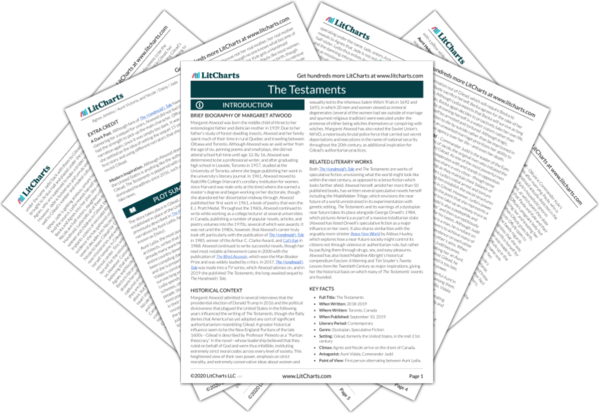Religious Totalitarianism and Hypocrisy
Following up 1985’s A Handmaid’s Tale, The Testaments depicts the last days of Gilead, a dystopian society that has replaced the United States in the near future. Gilead is a theocratic regime, meaning that its government and its religion are intertwined at every level, and the rulers believe that their authority comes from God himself. Thus, the ruthless oppression and terrible violence it inflicts are all done in the name of God, using pieces…
read analysis of Religious Totalitarianism and HypocrisyGender Roles
Gilead’s social structure is premised on its belief that men and women are unequal, which the leadership argues is biologically evident. Men, Gilead believes, are intelligent, sophisticated, and natural leaders, while women are presumed to be stupid, infantile, and weak, only fit for giving birth or doing chores in the home. Because of this belief, Gilead’s laws strictly enforce gender roles and contradicting them is punishable by public execution. Even so, the female characters are…
read analysis of Gender RolesTruth, Knowledge, and Power
Gilead, in all its repression, corruption, and brutality, is awash with secrets: who murdered whom, which biblical teachings are outright fraudulent, what really goes on in the highest levels of government. Gilead’s government goes to great lengths to keep those secrets. As a result, general citizens (and especially women) are kept as ignorant as possible, since Gilead’s leadership understands that the truth is a danger to them and the right knowledge in the right hands…
read analysis of Truth, Knowledge, and Power
Shame, Fear, and Repression
Gilead’s male leadership is obsessed with repressing women’s sexuality and keeping them “pure,” loyal, and subdued, even while the men in power abuse their authority to fulfill their own violently lecherous and often pedophilic whims. Agnes’s narrative, spanning her years in primary school through her young adulthood, models the mix of indoctrination, brutal punishment, and fear that Gilead uses to make women terrified of recognizing or exploring their own sexuality, and thus keeps them…
read analysis of Shame, Fear, and RepressionChoice
Women in Gilead are given little to no choice in nearly every aspect of their lives, and this lack of personal agency or autonomy becomes a source of anger, frustration, and fear for Agnes and Becka. However, even Nicole, who grows up in an open, democratic society in Canada and has considerably more power to make her own decisions, finds that sometimes she, too, is given little choice in major decisions in her…
read analysis of Choice






